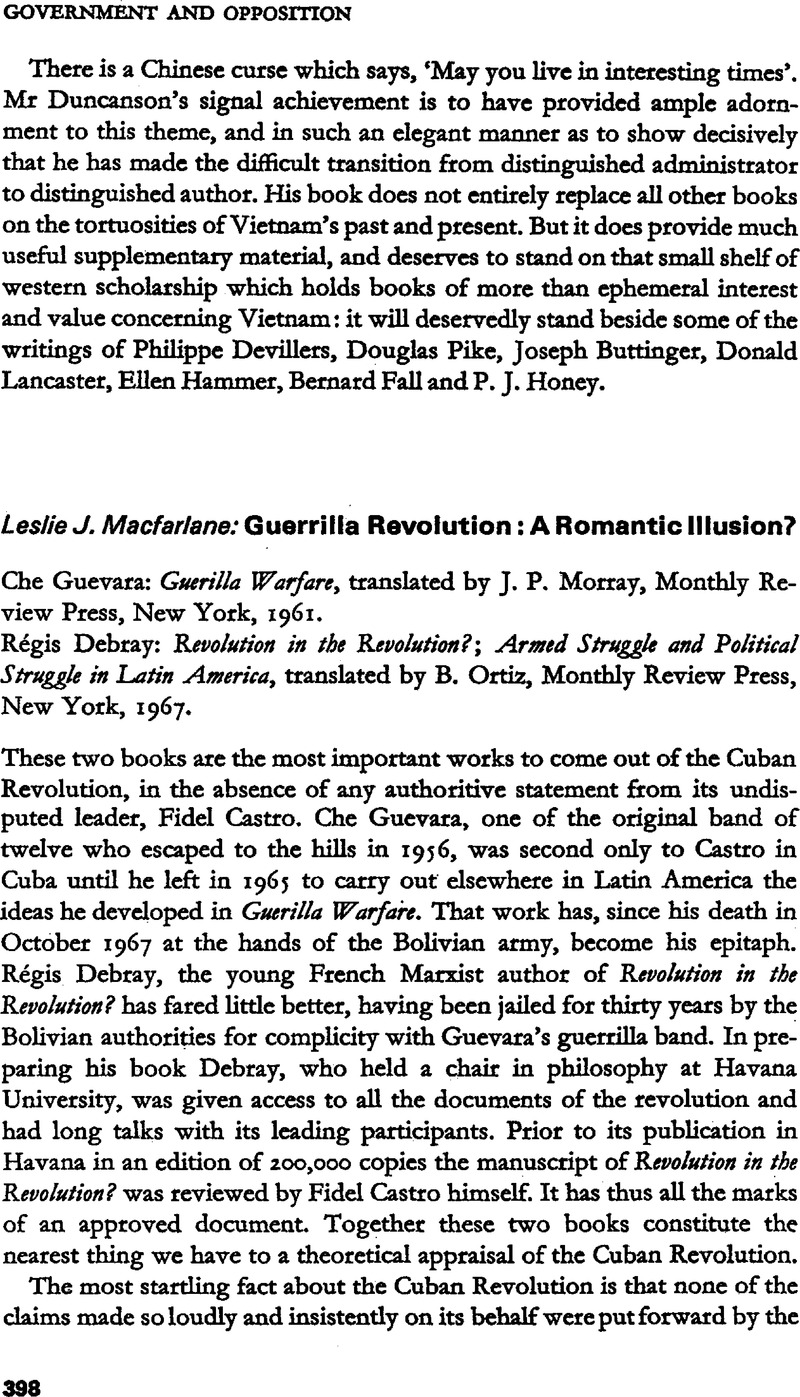No CrossRef data available.
Article contents
Guerrilla Revolution: A Romantic Illusion?
Published online by Cambridge University Press: 28 March 2014
Abstract

- Type
- Review Article
- Information
- Copyright
- Copyright © Government and Opposition Ltd 1968
References
1 See Draper, Theodore, Castroism: Tbeory and Practice, Pall Mall Press, 1965, pp. 12–14.Google Scholar
2 Che Guevara, Reminiscences of the Cuban Revolutionary War, translated by V. Ortiz, Monthly Review Press Publication, London, 1968, p. 136. The book throws interesting light on the hardships of guerrilla life and the difficulties faced in dealing with spies, traitors, deserters and bandits.
3 World Outlook, Vol. 5, No. 13, New York, pp. 345 and 346.
4 Draper argues (op. cit., p. 65, footnote) that J. P. Morray has mistranslated ‘el foco insurrectional’ as ‘the insurrection’ instead of as ‘the insurrectional focal point’. The translator of Debray's Revolution in the Revolution? writes that the Spanish word ‘foco’ has no English equivalent and refers to a centre of guerrilla operations rather than to a military base in the usual sense (p. 22 footnote).
5 International Socialist Review, November‐December 1967, New York, pp. 23 and 28.
6 The Essentials of Lenin, Vol. II, Lawrence and Wishart, 1947, p. 628.
7 Quoted by Draper op. cit., p. 76.
8 Quoted in Schram, S. R., The Political Thought of Mao Tse‐Tung, London, 1963, pp. 188–9.Google Scholar
9 In his speech of 13 March 1967 Castro said that in many Latin American countries the revolutionary movement was strong in the capital and weak in the countryside. Why? because the Marxist parties concentrated their attention on the city, on the workers' movement, which is, of course quite correct. But in many cases ‐ for naturally all these generalities have their exceptions ‐ they greatly underestimated the importance of the peasantry as a revolutionary force.‘World Outlook, Vol. 5, No. 13, p. 337. Guevara, on the other hand, brings out in his Reminiscences… the unreliable nature of the peasants’ attitude to the guerrillas. Though at first sympathetic and helpful, Batista repression and terror led them to become cold and to denounce the guerrillas to the army. It was only after the guerrillas achieved control of the Sierra Maestra that ‘little by little, as the peasants came to recognize the inviocibility of the guerrillas and the long duration of the struggle, they began responding more logically, joining our army as fighters’ (p. 197).
10 Fanon, Frantz, The Wretched of the Earth, Penguin Books, 1967.Google Scholar
11 Hobsbawm, Eric J. ‘Peasants and Rural Migrants in Politics’, The Politics of Conformity in Latin America, edited by C. Veliz, London, 1967, p. 64.Google Scholar
12 See International Socialist Review, November‐December 1967, pp. 52–7.
13 Lenin, V. I., Selected Works, Vol. X Lawrence and Wishart, 1938, p. 165.Google Scholar
14 While Mao Tse‐Tung's treatise, Guerrilla Warfare, makes no direct reference to the role of the communist party, it stresses the need for political officers to be attached to guerrilla units at all levels to carry out political work inside the unit, amongst the people and against the enemy. See chapter 5, section 2 and chapter 6 in Guerrilla Warfare by Mao Tse‐Tung and Che Guevara with foreword by Capt. B. H. Liddell Hart, London, 1962.
15 International Socialist Review, November‐December 1967, p. 26.
16 In this connection it is interesting to note Engels's remarks on the ‘approaching’ revolution in Russia, written in a letter dated 23 April 1885. ‘This is one of the exceptional cases where it is possible for a handful of people to make a revolution i.e. with one small push to cause a whole system ‐ to come crashing down’…‘when 1789 has once been launched, 1793 will not be long in following’. The Correspondence of Marx and Engels, Lawrence and Wishart, 1936, pp. 437–8.
17 World Marxist Review, August 1965.




